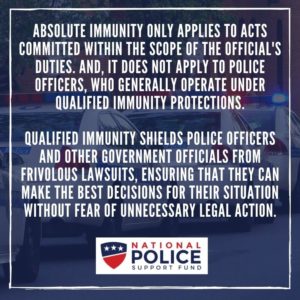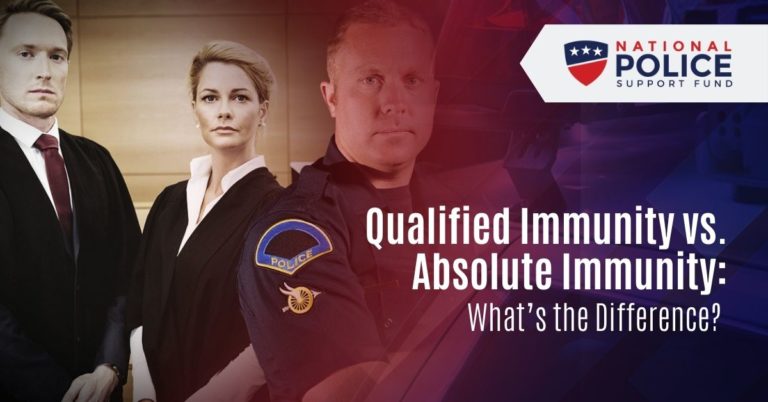As debates about qualified immunity for police continue, we thought it would be helpful to examine qualified immunity vs. absolute immunity to show how they differ and how they are applied to people within the criminal justice field.
Absolute Immunity
Absolute immunity provides legal protection to judges, prosecutors, legislators, and executive officials for actions committed in their official duties without malice or corrupt motives. Absolute immunity protects these individuals from both criminal prosecution and civil lawsuits.
In addition to high-level legal and government officials, witnesses testifying in court have absolute immunity (though they are still subject to perjury), as do Presidential aides who can make the case it’s necessary for them to complete their jobs.
The President of the United States, however, only has absolute immunity from civil claims, not criminal charges. The Supreme Court issued this ruling in Nixon v. Fitzgerald in 1968 — a case involving a lawsuit filed by a government contractor against Richard Nixon while he was President.

However, it’s important to keep in mind that absolute immunity only applies to acts committed within the scope of the official’s duties. And, it does not apply to police officers, who generally operate under qualified immunity protections.
Qualified Immunity
While not as robust as absolute immunity, qualified immunity still offers several important legal protections for police officers so they can focus on keeping their communities safe without fear of unnecessary retribution.
According to the Legal Information Institute at Cornell Law School, qualified immunity “protects a government official from lawsuits alleging that the official violated a plaintiff’s rights, only allowing suits where officials violated clearly-established law.
Like absolute immunity, qualified immunity shields police officers and other government officials from frivolous lawsuits, ensuring that they can make the best decisions for their situation without fear of unnecessary legal action.
In the 2009 case Person v. Callahan, the Supreme Court said, “qualified immunity balances two important interests—the need to hold public officials accountable when they exercise power irresponsibly and the need to shield officials from harassment, distraction, and liability when they perform their duties reasonably.”
Understanding the Difference
At a time when being a police officer is more precarious than ever, it’s important to understand which legal protections apply to law enforcement officers. Someone thinking they’re covered under absolute immunity might make different decisions than someone who knows the facts of qualified immunity.
As a grassroots education and support organization, the National Police Support fund is committed to helping its members understand the important differences between absolute immunity and qualified immunity, and how they impact the day-to-day work of law enforcement officers throughout the country.
For more information on qualified immunity, visit our facts page at: https://nationalpolicesupportfund.com/issues/qualified-immunity/









